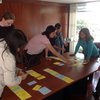Flood solutions catalogue – Practical Action

Project Background
We worked with Practical Action, an international development charity that helps communities build on their skills and knowledge to produce sustainable solutions to protect and transform their lives. Practical Action wanted us to do a discovery process for the Flood Solutions Catalogue, which forms part of the wider Zurich Flood Resilience Alliance, who also works the International Federation of the Red Cross (IFRC), the International Institution for Applied Systems Analysis (IIASA) and the Wharton Risk Management and Decision Processes Centre (Wharton). They also wanted Aptivate to develop a central resource with a key aim of providing information and support resources for communities affected by flooding and the organisations that support them in Peru. We aimed to run a user centred discovery process and to train Practical Action in Lima to continue this work independently.
Preparation for the Project
We interviewed the main stakeholders in the project; these included community members from the river Rimac area of Peru, community leaders and national institutions that have a local presence and a large scope to react to flooding. Aptivate worked closely with Rob from Practical Action and also trained Sachin Sapkota from the Nepalese Practical Action office, who provided valuable insights into the main issues.
The Process
We made extensive use of Google+ community to contain all of the audio and visual output, as well as all the resources. This enabled a quick sharing of all the content and a very effective way to feed back to the users. We set up workshops in Lima with people from the community on the river Rimac. This gave us the opportunity to really learn about people’s lives and the issues they faced. It was a very interactive and hands on workshop, which really helped people get to know each other.
The Uniqueness of the Project
We were determined to discover what technology people were already using rather than just imposing technology on people. We took a participatory approach to the project and designed interactive workshops with members of communities near the river Rimac that are prone to flooding. Aptivate learnt that community members felt they wanted more communication with other communities affected by flooding through social media and a way to interact with technical information.
Setbacks
Working with Practical Action in Lima showed the limits of participatory development. We were confined to the capital, and not the areas in which Practical Action operated. This limited our insight into the real life experience of the people we strove to help. Zurich Insurance, the main funder of Practical Action who headed the project, had a more technical approach to flood mitigation that sometimes put their ideas for the catalogue slightly out of line with the communities. In one example, one community didn’t even realise a project was being developed. However, Zurich, Practical Action and the community were able to reconcile their objectives to create a viable project that benefitted all.
The Future
It is an on-going project. We discovered gaps in our knowledge so Zurich and Practical Action will go back to interview more people from students to experts to constantly evolve and improve the project. Sachin also used his experience in Peru to develop user workshops in Nepal, to help widen the scope Aptivate’s work with Practical Action globally.
